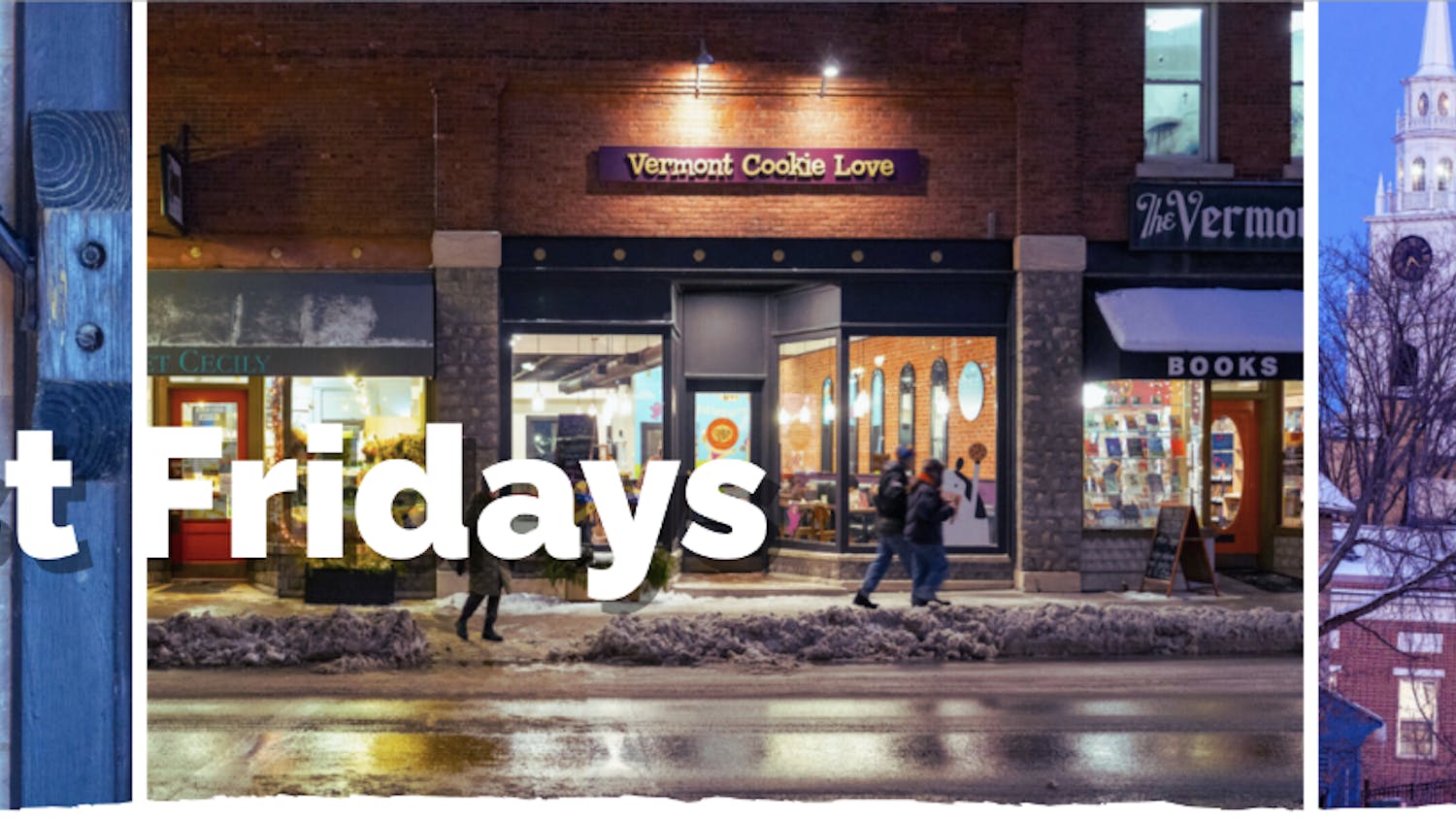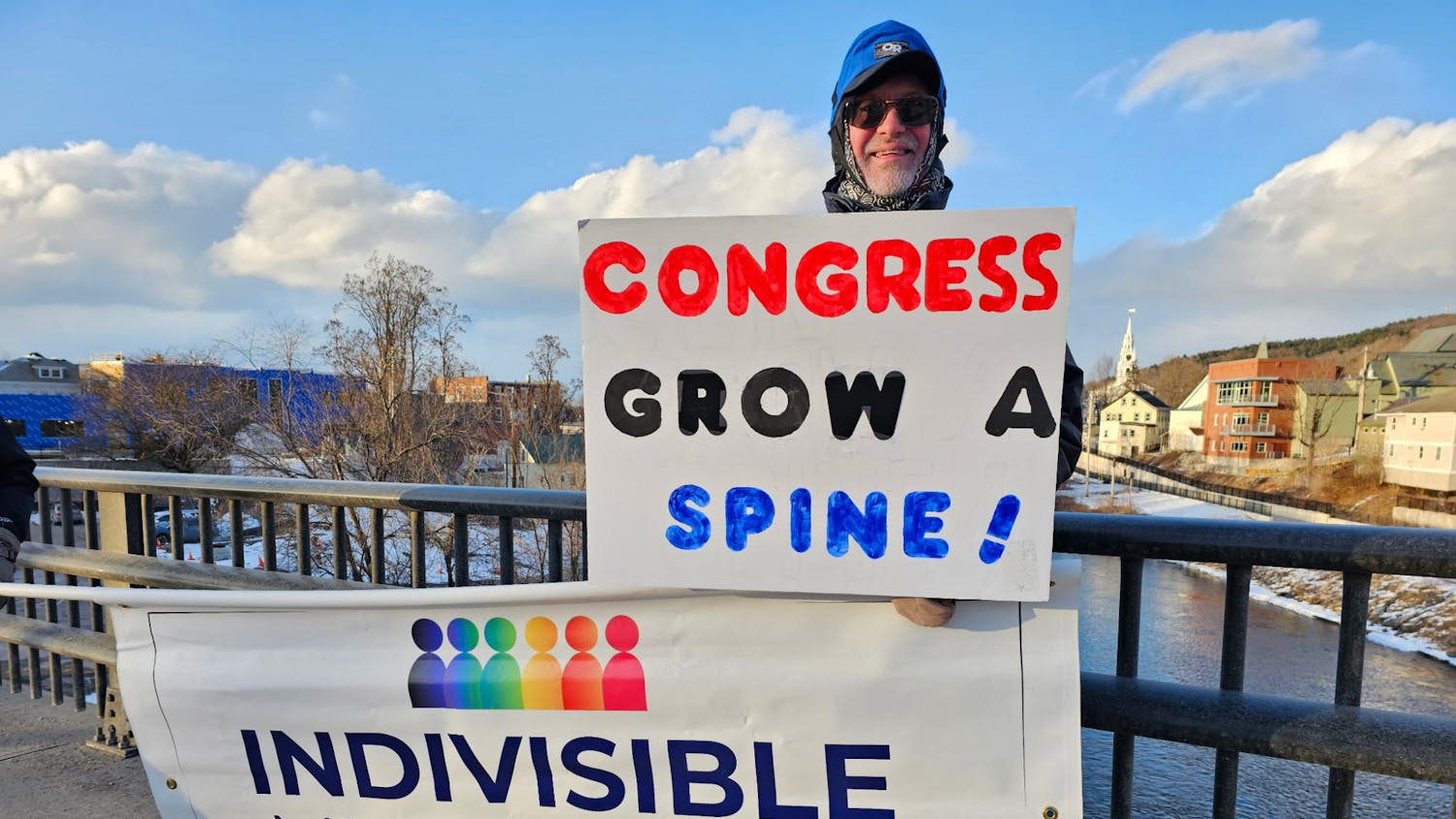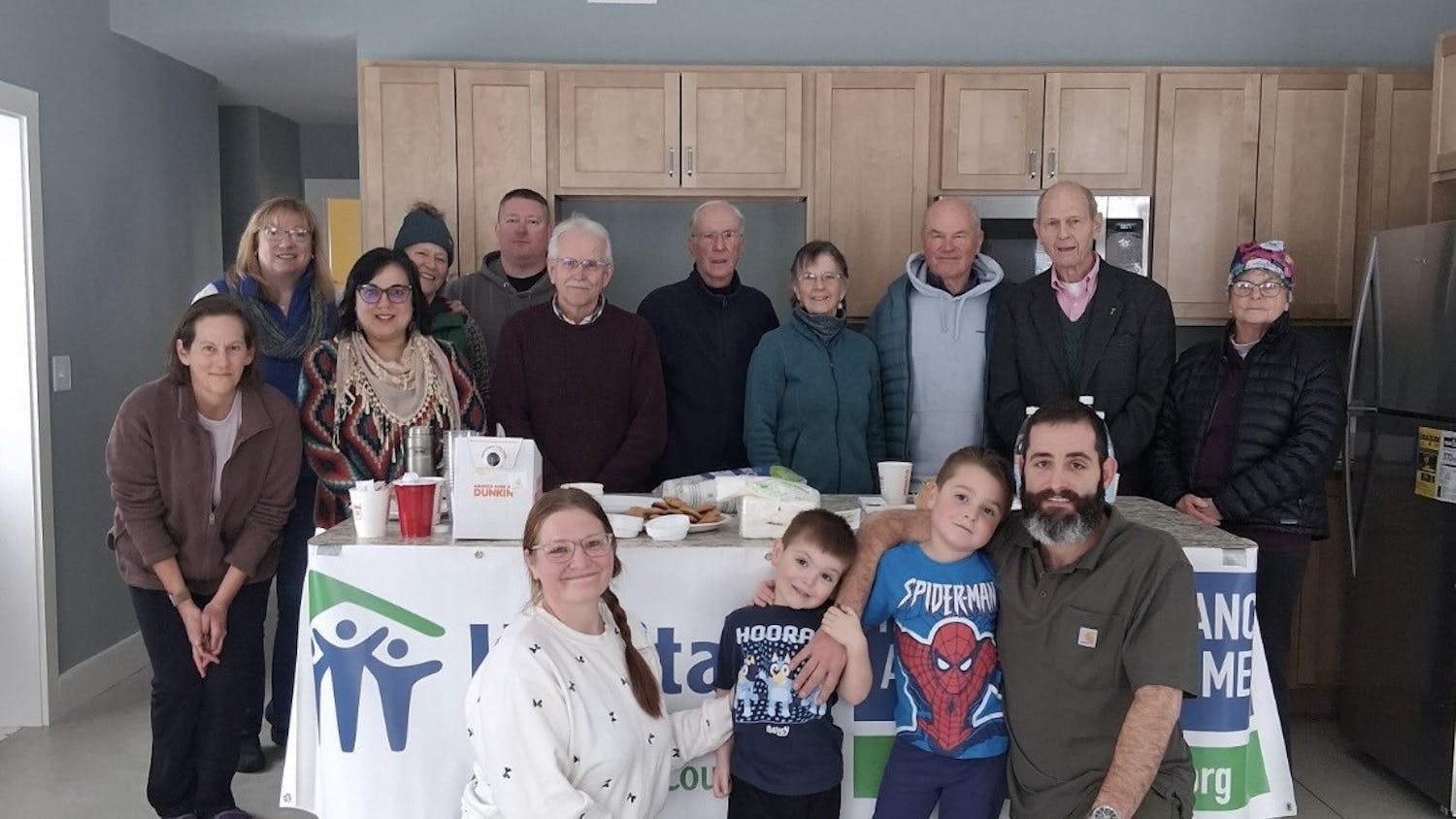MIDDLEBURY – When I walked in, it very well looked like Dan Freeman had been in the same spot for most of the day, hunched over his workbench, aligning pieces of dark brown leather together, with nothing but the odd gust of wind bristling against his north-facing window to distract him.
“I’m working a little harder than I usually do,” he said, reaching for his glue well. “I talked my doctor into getting a pair of handmade shoes, and it turns out he’s really particular.” Freeman smirked and brushed a layer of glue on the pressed edges. “I’m already on my fourth model with him.”
Freeman wears a tucked-in faded button-down, an aged pair of blue jeans and a leather waist-apron, scratched by edge-bevelers and saturated with dye. His sandy-white mustache is reminiscent of the one your grandfather had, and his straight hair is long enough to creep in front of his round eyeglasses, an annoyance which he frequently attends to by combing his bangs to the side.
“I am good at the 2D to 3D visualizations, and the small motor skills,” he said. “Athletics and academics — not so much. But we all have things we’re good at, and I guess I was lucky enough to find it.”
Of course, Freeman did not “find” shoemaking immediately. His bent for the craft began when he failed out of Duke University as a sophomore and was subsequently drafted into the United States Army as a mortar gunner stationed at Coleman Barracks, outside of Mannheim, Germany.
“It was never fun being in the army,” Freeman said, “but I look back on it now and I have nothing to complain about. It taught me that if you don’t take steps to control your fate, someone else will take them for you, and you might not like what they choose.”
A soldier in 1968, Freeman considered himself lucky not to have fought in Vietnam, where the majority of American draftees were sent at the time. In the spring of 1970, the Philadelphia native finished his deployment, and quickly began work at a friend’s sandal shop in Chapel Hill, N.C., only a stone’s throw away from his old college town.
“We over-engineered everything and made it all simple and durable. There was traction for that then,” he said. “People liked things that were handmade and rugged.” While working in Chapel Hill, Freeman met his future wife, a Vermont native and self-funded master’s student at the University of North Carolina. In a few years, the couple moved back up to Vermont, first settling in the town of Plainfield, and then, only a year later, in Middlebury.
“That’s how it all started,” Freeman said.
It was around this time in the mid-1970’s that Freeman decided he wanted to make shoes for a living. By chance, he was connected with a Jamaican boot maker living in New Orleans through a serendipitous conversation with a university student visiting the college town one summer. After sending a letter down to Louisiana, he took a risk and rode a Greyhound bus 1,700 miles to New Orleans, in hopes of an apprenticeship.
“When you’re 28, you’re brave like that. I found the guy in his repair shop and there were all these beautiful shoes laying around. I told him, ‘I want to learn how to make shoes,’ and he said, ‘Son, I want you to go away. Don’t waste my time.’ I hung around New Orleans for three weeks, and I finally convinced him I was serious. He said he would take me on as an apprentice and teach me everything he knew.”
During his subsequent training, Freeman’s wife taught in the city. After years of work, they moved back to Middlebury in 1986, where Freeman started “Leather Brothers.” Within the year it became “The Leatherworks,” as the town now knows it.
For more than three decades, Freeman has owned the shop on 2 Park Street, fashioning leather footwear for customers that have special orthotic requirements, and for those who just appreciate a boot made to last a lifetime.
His operation is tight: with a retail space of a few hundred square feet, and a similarly sized workshop behind the counter, there’s not a lot of extra room to dance. In the back of the store is a pantry, where Freeman keeps his fine leather rolled and stored. Wooden and plastic casts, reminiscent of mummified feet, fill every crack and crevice of shelf space, and Freeman has hundreds more hidden away in storage. A collection of sewing machines near the counter, a leather splitter, an anvil dangling near the edge of an old wooden side table and a leather sander covered with old Phillies stickers, make meandering through the shop feel like venturing through a maze.
“A real shoemaker could make a pair (of shoes) with a knife and fork,” he joked, admitting to the amount of modern equipment in the shop.
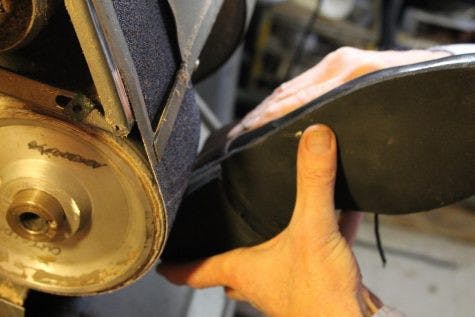
Freeman’s handiwork in action.
Beyond the charming aesthetics of Freeman’s studio machinery and the shiny boots that almost display themselves on the racks, the business of shoemaking is a combination of oddity, rarity and novelty. In an industry with very low supply, and subsequent low demand, to the untrained eye, Freeman’s work may seem financially unsuccessful and doomed for closure, like many adjacent small businesses in Middlebury.
“In the summer, I might have ten or fifteen customers come in to the store (daily),” Freeman said, implying each visitor might take a look at the collection of belts and other miscellaneous leather goods he retails in-house. “Any sale in here is usually $50 or $60, which is usually enough to pay rent for that day.” The winter months see a huge decline, and Freeman admits some days he has no retail customers open his door. However, the stagnancy of Middlebury’s retail industry doesn’t bother him for a few reasons.
“When I go visit my family in Philly, every time I go into a store, the clerks are short-tempered, and the drivers are too,” he said. “They are getting abused all day. If you are constantly fighting other drivers and rude people yelling at you, it’s going to affect your personality. When you don’t interact with more people and they are friendlier, it’s just easier and it makes you nicer. And you’re nicer to other people.”
But don’t be fooled by the silence of Freeman’s shop, because behind this façade of an empty Vermont storefront lies the truth that Freeman can’t keep up with the custom orders put on his business.
“I make shoes all day,” he said. There’s a list of names hidden on the far side of one of the shop’s supporting beams that Freeman calls his “A list”: the customers who have purchased at least two pairs from him. Consider his “B list,” then, a group double the length that have bought a single pair from him.
Leatherworks has an established reputation, and, combined with the slow, time-consuming process of making shoes, Freeman has built a — somewhat — stable life for himself that requires him to show up to work every day and get his leather apron a little dirtier.
“It really is not a great business plan,” he admitted. “You need a lot of knowledge, and even with the high prices, you cannot really make much of a profit. However, I’m not complaining. When (customers) put on their shoes, smile, and get out their checkbook, that’s what I work for. I need that check too, but what I work for is making shoes that people like to wear, and wear them all the time.”
The Cordwainer on Park Street: A Peek into the Working Life of Leatherworks Owner Dan Freeman
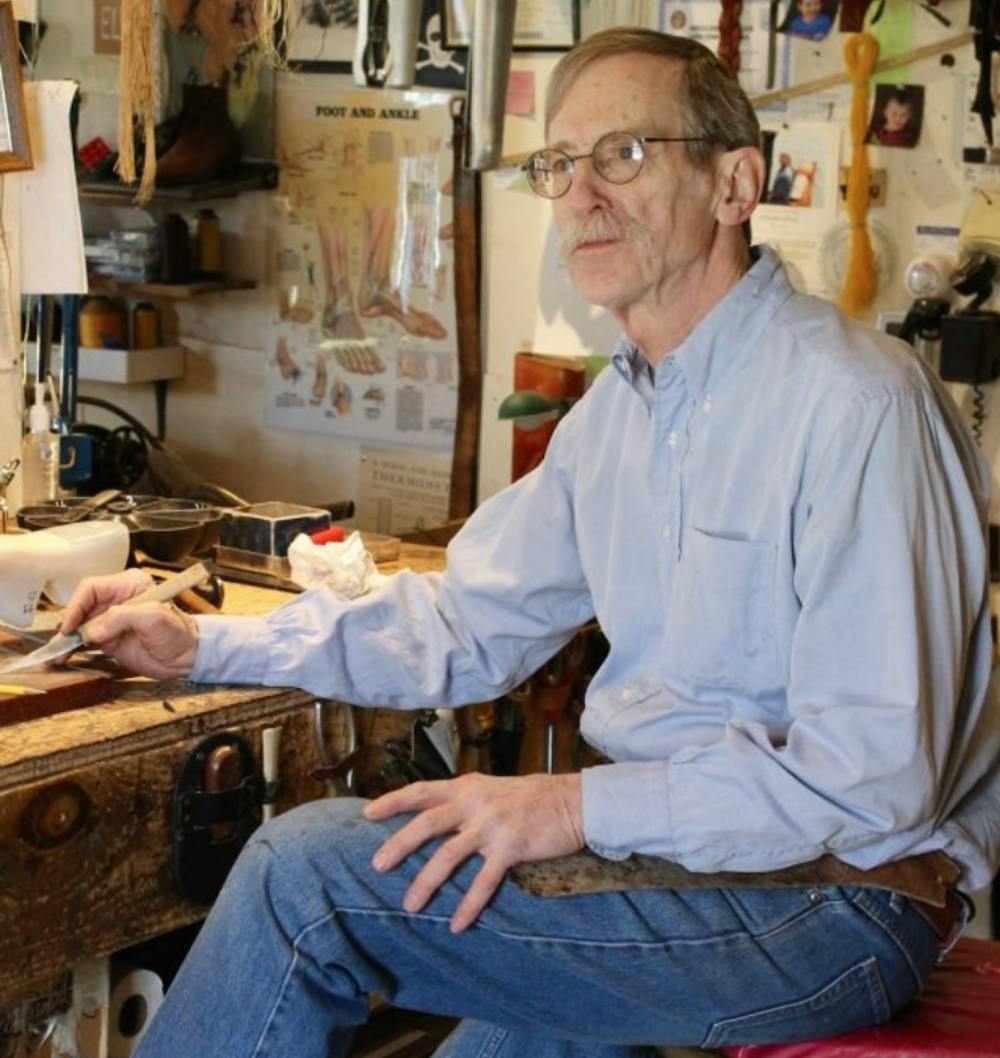
BENJAMIN GLASS
Since 1986, Dan Freeman has dedicated most of his working life to making custom leather shoes and boots at Leatherworks in Middlebury.
Since 1986, Dan Freeman has dedicated most of his working life to making custom leather shoes and boots at Leatherworks in Middlebury.
BENJAMIN GLASS
Comments

